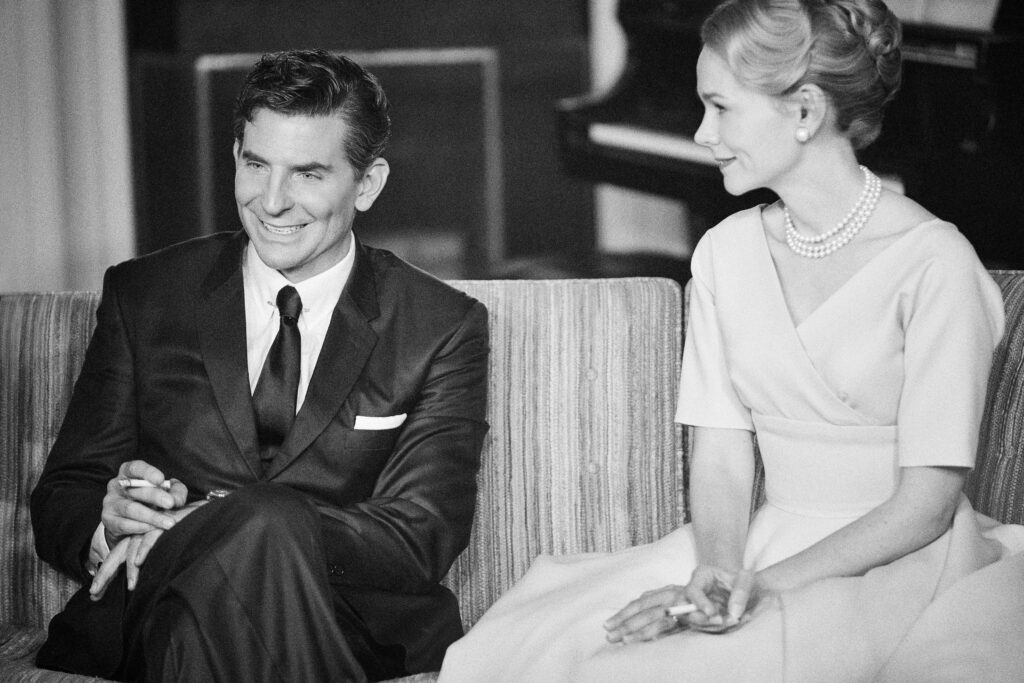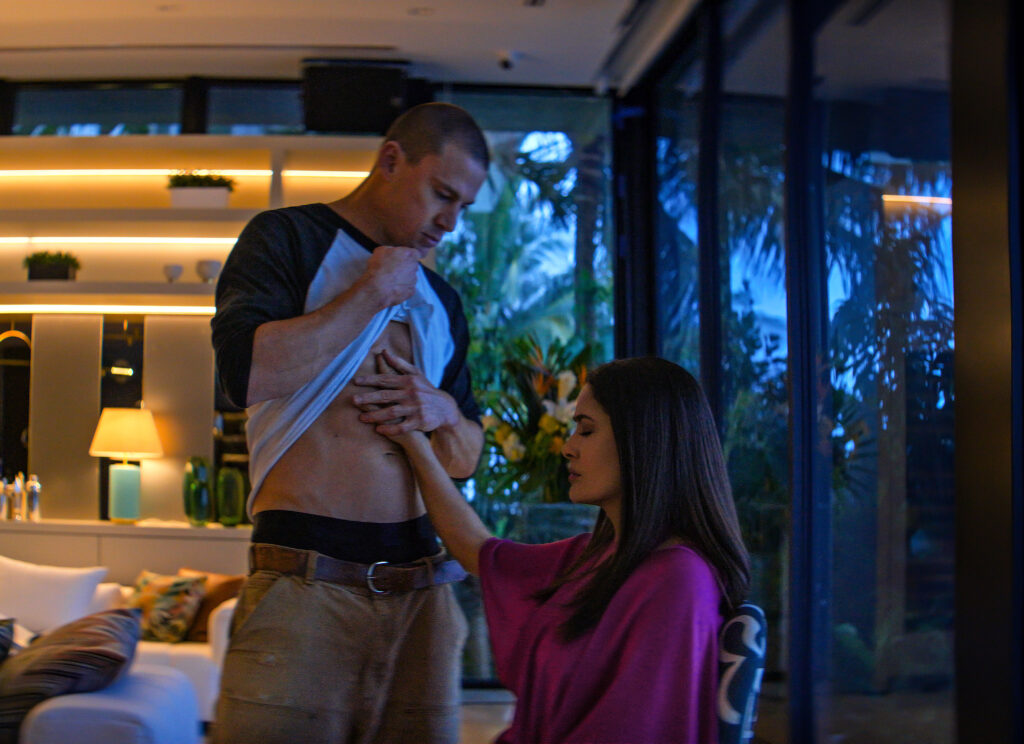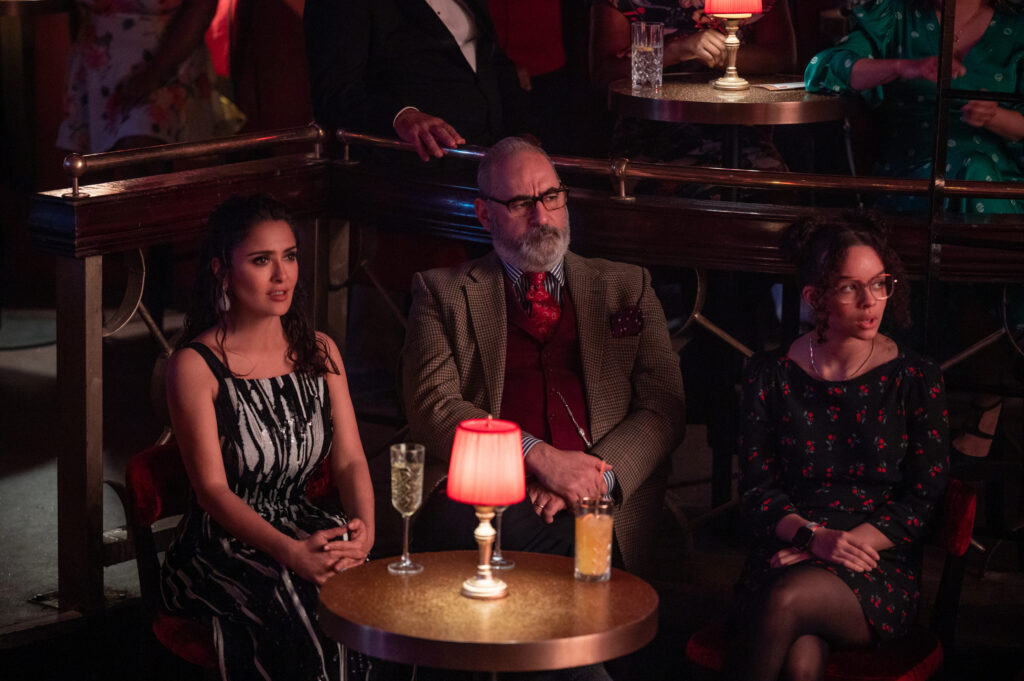October 7, 2023
by Carla Hay

Directed by Bradley Cooper
Culture Representation: Taking place mostly in New York state, from the mid-1940s to the mid-1980s, the dramatic film “Maestro” features a predominantly white cast of characters (with a few African Americans) representing the working-class, middle-class and wealthy in this biopic of mega-famous composer/orchestra conductor Leonard Bernstein.
Culture Clash: Bernstein led a double life as a semi-closeted queer man who had male lovers during his entire relationship with actress Felicia Montealegre, who knew about his true sexuality and was his wife from 1951 until her death from cancer in 1978.
Culture Audience: “Maestro” will appeal primarily to people who are fans of Bernstein; stars Bradley Cooper and Carey Mulligan; and decades-spanning biopics, even if the movie looks like it’s trying too hard to win major awards.

“Maestro” skillfully depicts the life of a fiery and mercurial music star, even if this very flawed protagonist will leave some viewers cold because of his unrelenting narcissism and selfishness depicted throughout the movie. In this Leonard Bernstein biopic, his musical talent is a very secondary part of the story, compared to his personal relationships. Some viewers won’t like the timeline jumping and small number of musical scenes, but the acting performances are stellar.
Directed by Bradley Cooper (who co-wrote the “Maestro” screenplay with Josh Singer), “Maestro” had its world premiere at the 2023 Venice International Film Festival and its North American premiere at the 2023 New York Film Festival. Cooper stars in “Maestro” as Bernstein, the influential and very famous composer/orchestra conductor, whose best-known work includes writing the music for “West Side Story” and being the longtime music director for the New York Philharmonic Orchestra. Bernstein died in 1990, at the age of 72. For the purposes of this review, the real Leonard Bernstein is referred to as Bernstein, while the character of Leonard Bernstein in “Maestro” is referred to as Leonard.
“Maestro” is Cooper’s second movie as a director. He made his feature-film directorial debut with the 2018 remake of “A Star Is Born,” which is a far superior movie when it comes to authentic-looking scenes that grab people’s emotions and never let go. “Maestro” has all the characteristics of an “awards bait” movie (including Oscar-winning filmmakers Steven Spielberg and Martin Scorsese as producers), but many of the scenes look a little too staged. The movie’s jumpy timeline editing (the story is told in non-chronological order) gives “Maestro” a fidgety tone that might cause some viewers to lose interest by the time the movie is half-over.
“Maestro” (which takes place mostly in New York state) begins and ends with a scene taking place sometime in the 1980s, when Leonard is giving a recorded TV interview that is being filmed in what appears to be a library room in his home. The “Maestro” scenes that take place in the 1970s and 1980s are in color. Any scene taking place before the 1970s is in black and white. In the beginning of the movie, during this opening interview scene, a frail-looking Leonard plays a little bit of piano while he mumbles a few sentences. (This movie’s makeup and hairstyling are above-average, especially in the scenes with Leonard as an elderly man.)
The movie then suddenly flashes back to New York City to 1946, when Leonard wakes up in bed next to clarinetist David Oppenheim (played by Matt Bomer), his lover at the time. (There is no nudity in this movie.) Leonard (whose real name was Louis Bernstein) playfully slaps David on the rear end before jumping out of bed. At the time, Leonard was a young and famous composer/conductor on the rise in the music world, with lots of charm, confidence and enthusiasm. Leonard prefers to be called Lenny by people he knows or those whom he wants to know.
It isn’t long before social butterfly Leonard meets actress Felicia Montealegre (played by Carey Mulligan) at a party hosted by Claudio Arrau (played by Oscar Pavlo), who was Felicia’s piano instructor at the time. Felicia (who born in Costa Rica, and raised in Chile) is intelligent, witty and very self-assured. Felicia and Leonard have an instant connection expressed through flirting and banter. They soon begin dating, and he is very up front in telling her his secret: He’s also sexually attracted to men. Felicia doesn’t seem to have a problem with it because Leonard makes her happy, and he seems to genuinely love her—just not in the way that he loves men.
Leonard juggles his relationships with David and Felicia, until he decides to spend more time in a committed relationship with Felicia. When Leonard introduces Felicia to David for the first time, the eventually jilted David seems a little envious but not too bothered that Felicia has captured Leonard’s interest. Apparently, David is used to Leonard’s polyamorous ways. Felicia will never really gets used to it.
Someone who approves of Felicia is Leonard’s younger sister Shirley (played by Sarah Silverman), who is sarcastically funny and who knows about Leonard’s true sexuality. The movie depicts Shirley being at the same party where Felicia and Leonard met. Felicia and Shirley become genuine friends. Shirley and Felicia are close enough that Felicia confides in Shirley when she’s having marital problems with Leonard.
As an experienced actress in theater and television, Felicia has her own established career when she meets Leonard. As depicted in “Maestro,” Felicia’s American father Roy Elwood Cohn owns a performing arts theater where she and Leonard meet for dates. Leonard and Felicia have a quick courtship where she’s the one who brings up marriage to him first. “Let’s give it a whirl,” she smiles when they decide to get married. Leonard and Felicia get married in 1951. He was 33, while she was 29.
The movie then flashes forward to 37-year-old Leonard and 33-year-old Felicia as new parents to their first child, a daughter named Jamie. They would eventually have two more children: middle child Alexander (nicknamed Alex) and youngest child Nina. “Maestro” depicts Jamie (played as a teenager and young adult by Maya Hawke) as the child who has the closest bond to Leonard. She is curious and intelligent—just like her father.
Alex and Nina are barely in the movie. Brooklyn Rockett portrays Jamie as a child. Sam Nivola has the role of Alex as a teenager/young adult. Alexa Swinton is Nina as a teenager. Maybe the real-life Alex and Nina did not want to be featured prominently in the movie for privacy reasons. Whatever the reason is, Alex and Nina are sidelined characters with vague personalities.
When Jamie goes away to college, she is the one who asks Leonard if the gossip that she’s hearing about him is true. Jamie doesn’t come right and say what she’s heard, but Leonard knows she’s heard that he has affairs with men. Felicia has made Leonard promise never to tell their children the truth about his sexuality, so he lies to Jamie and says the gossip isn’t true, although he hesitates for a moment as if he’s on the verge of telling her the truth.
Don’t expect “Maestro” to show the inner workings of how some of Bernstein’s classics were made. There are really only two big performance scenes that show Leonard conducting an orchestra. They are masterfully filmed and impactful scenes, but then the movie goes right back to what the majority of the story is about: Leonard pursuing younger men, while Felicia tries and often fails to not be jealous.
The movie hints at but doesn’t explicitly show Leonard’s promiscuity. For example, there’s a scene where married Leonard has a pleasant conversation in a park with David and David’s wife, who have their newborn baby with them. Leonard leans in to talk to the baby and says, “Can I tell you a secret? I slept with both of your parents, but I’m reigning it in.”
The scene is played for laughs (David and his wife think that Leonard’s comment is funny), and it’s an effectively comedic moment in the movie. However, there are underlying issues with Leonard that are shown in this scene—namely, Leonard’s flippant attitude over his comment about “reigning it in” indicates that he knows his sexual antics are probably out of control and hurtful to people, but he doesn’t care enough to really stop the emotional pain he causes. His attitude is: “This is who I am. Deal with it.”
The male lover who becomes a constant companion to Leonard is Tommy Cothran (played by Gideon Glick), who was a music director at a San Francisco radio station when he met Leonard at a party in 1971. When they first meet, Leonard and Tommy flirt openly with each other in front of Felicia. And within minutes, Felicia sees Leonard and Tommy kissing in a hallway at the party. She walks away, looking hurt but not too surprised.
Later, when the relationship between Tommy and Leonard becomes more serious, Leonard insists that Tommy be treated like a member of the family. Tommy is frequently included in family activities, such as meals, trips and parties. When Tommy, Leonard and Felicia go on dates together, Felicia is the one who feels like the awkward third wheel.
At first, Felicia tries to act like she’s okay with this arrangement. But it eventually starts to bother her a lot. Felicia and Leonard have more arguments, and they decide to separate but never get divorced. The movie has hints that Leonard abused cocaine or was addicted to cocaine in the 1970s and 1980s. (Observant viewers will notice how sweaty-looking he is in his older years.)
Felicia asserting herself in her marriage and how she deals with her cancer diagnosis are among the best scenes in “Maestro.” Mulligan excels in these scenes that show Mulligan’s exceptional talent in portraying a wide range of emotions. It’s not an exaggeration to say that although the movie is called “Maestro” and it’s a Leonard Bernstein biopic, the soul of the movie is about Felicia.
Felicia also has some of the best lines in the movie. While arguing with Leonard about his deceitful double life (which she admits she’s enabled), she tells him: “There’s a saying in Chile: ‘Never stand underneath a bird that’s full of shit.’ I’ve been living under that bird for too long.” Later in the argument, Felicia makes this cutting remark to Leonard: “If you’re not careful, you’re going to die a lonely old queen.”
Meanwhile, self-absorbed Leonard utters mopey lines such as, “I feel like the world is on the verge of collapse.” It’s quite an ironic statement, when Leonard is constantly shown to be the one causing chaos in his own personal life. The problem with his attitude is that he acts as if he entitled to do what he wants because it feels good to him, even if it hurts other people. When confronted with the consequences of his actions, he acts as if everyone is uptight and wrong for not understanding him.
“Maestro” certainly is elevated by all the great talent in front of and behind the camera. However, after a while, the movie becomes a little too fixated on Leonard’s marital problems and his obsession with seducing men who are younger and less powerful than he is. (In a lecherous scene that takes place after he and Felicia have separated, Leonard is shown getting sexually involved with one his male students who is in Leonard’s orchestra class.) Cooper gives a very ambitious performance, but it all looks very calculated—a bright, polished sheen on a very troubled and complicated man.
Although technically proficient, “Maestro” needed to be more balanced in the story to show more of Leonard’s musical side. It’s like doing a feature-length biopic about a famous singer and only showing the singer perform two or three songs. The movie looks great, thanks to top-notch cinematography from Matthew Libatique, but the story is told like a book with its chapters slightly jumbled.
“Maestro” wants to have its cake and eat it too: It tries very hard to make it look like Felicia was the love of Leonard’s life, and yet he seemed to care more about making his lover Tommy happy. True love also does not inflict the type of suffering that Felicia endured in the marriage. Although she knew about Leonard’s sexuality before they got married, Felicia probably did not anticipate how his double life would be so painful to her and their children.
Bernstein certainly led a very full and accomplished life that deserves a biopic. And there are definitely plenty of reasons why “Maestro” should be seen by people, especially those who are inclined to watch biographical films about celebrities. Just don’t expect this movie to be completely cohesive or thorough in detailing major aspects of Bernstein’s life that aren’t about how his sexuality affected his personal relationships.
Netflix will release “Maestro” in select U.S. cinemas on November 22, 2023. The movie will premiere on Netflix on December 20, 2023.



